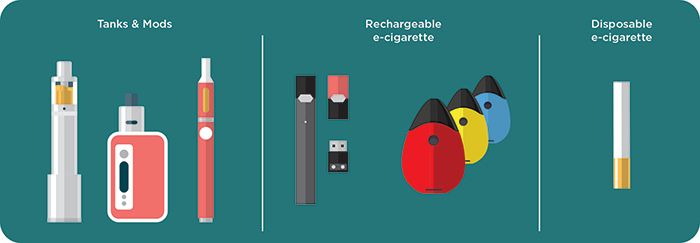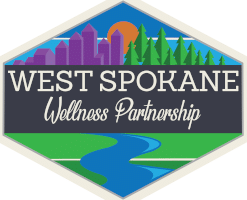E-Cigarettes / Vaping
E-Cigarettes
What Are E-cigarettes?
- E-cigarettes are electronic devices that heat a liquid and produce an aerosol, or mix of small particles in the air.
- E-cigarettes come in many shapes and sizes. Most have a battery, a heating element, and a place to hold a liquid.
- Some e-cigarettes look like regular cigarettes, cigars, or pipes. Some look like USB flash drives, pens, and other everyday items. Larger devices such as tank systems, or “mods,” do not look like other tobacco products.
- E-cigarettes are known by many different names. They are sometimes called “e-cigs,” “e-hookahs,” “mods,” “vape pens,” “vapes,” “tank systems,” and “electronic nicotine delivery systems (ENDS).”
- Using an e-cigarette is sometimes called “vaping.”

Some e-cigarettes look like regular cigarettes, cigars, or pipes.
Some look like USB flash drives, pens, and other everyday items.
How Do E-cigarettes Work?
- E-cigarettes produce an aerosol by heating a liquid that usually contains nicotine, flavorings, and other chemicals that help to make the aerosol.
- The liquid used in e-cigarettes often contains nicotine and flavorings. This liquid is sometimes called “e-juice,” “e-liquid,” “vape juice,” or “vape liquid.”
- Users inhale e-cigarette aerosol into their lungs. Bystanders can also breathe in this aerosol when the user exhales it into the air.
- E-cigarette devices can be used to deliver marijuana and other drugs.
West Spokane Wellness Partnership provides e-cigarette/vaping education to schools, parents/caregivers, school staff, and community on an ongoing basis. See our events page to learn more!
Learn more about E-cigarettes here:
- https://truthinitiative.org/research-resources/emerging-tobacco-products/e-cigarettes-facts-stats-and-regulations?cid=paidsearch_google_ecigs&disposables_e-cigarette101&gclid=Cj0KCQjw8IaGBhCHARIsAGIRRYqmNKc_wSzLhdYmVOsBjP-7kGIhUR4Bxp2R0aPdlFs48jwkERQxrTAaAq5MEALw_wcB
- https://www.cdc.gov/tobacco/basic_information/e-cigarettes/Quick-Facts-on-the-Risks-of-E-cigarettes-for-Kids-Teens-and-Young-Adults.html
- https://smokefree.gov/quit-smoking/ecigs-menthol-dip/ecigs
- https://www.drugabuse.gov/publications/drugfacts/vaping-devices-electronic-cigarettes
- https://www.lung.org/quit-smoking/e-cigarettes-vaping/lung-health
- https://www.tobaccofreekids.org/protectkids/signup?utm_medium=ads&utm_source=Google&utm_content=Search&utm_campaign=AlwaysOnSearch-2021&sl_tc=ACQ-Search&gclid=Cj0KCQjw8IaGBhCHARIsAGIRRYr_AASf4Op8q_TIuxcZNomEtbTJy-hEZE6ILkHhRqfF0qI7hh3V1dEaAgiKEALw_wcB
